Introduction
The distinction between general search engine optimization (SEO) services and healthcare or medical SEO services is important to understand. With the more recent introduction of search engine concepts like E.A.T. (Expertise, Authority, and Trust) and Y.M.Y.L. (Your Money, Your Life), Google has made it clear that websites that speak about health related topics are held to a higher standard than other types of content. Traditional agencies have attempted to create an effective healthcare SEO strategy in the past, but the results are typically minimal or difficult to track. SEO which will produce the best possible results in this space requires the expertise of an agency that solely specializes in healthcare.
Tidal Health Group has extensive and exclusive experience in healthcare SEO services. Our service efforts are rooted in technology – specifically, the development of our own Healthcare CMS platform. Our team is constantly testing and developing new functionality to understand if we are presenting each of our clients as an authority in the healthcare marketplace. This helps them continue to get more organic traffic from search engines over time. The modern healthcare SEO landscape can be very fragmented, with campaigns being cobbled together from multiple different agencies and technologies. Services like local SEO, schema markup, keyword research, page speed, user experience, and more need to all be carefully crafted together to perform an effective healthcare SEO campaign.
If you aren’t familiar with the EAT and YMYL concepts, we have extensive articles which go further in-depth on these subjects. An important detail to know is that they were introduced through a document called the Google quality raters guideline. This document is constantly evolving and provides guidance to real people judging search engine results. A very recent and important update was made which further clarified the distinction of which page types fall under those two concepts.
YMYL
We firmly believe any website that speaks about health care related topics falls under the “Your Money, Your Life” categorization. You can use the quality rater guideline tables to attempt to find where in the spectrum of this concept you fall. This can be highly useful in informing your healthcare SEO efforts. WSince our team specializes in healthcare SEO we don’t spend much time on whether this topic is appropriate or not because our team specializes in healthcare SEO, therefore all of our clients fall under the category. That makes this next concept particularly appropriate for our purposes.
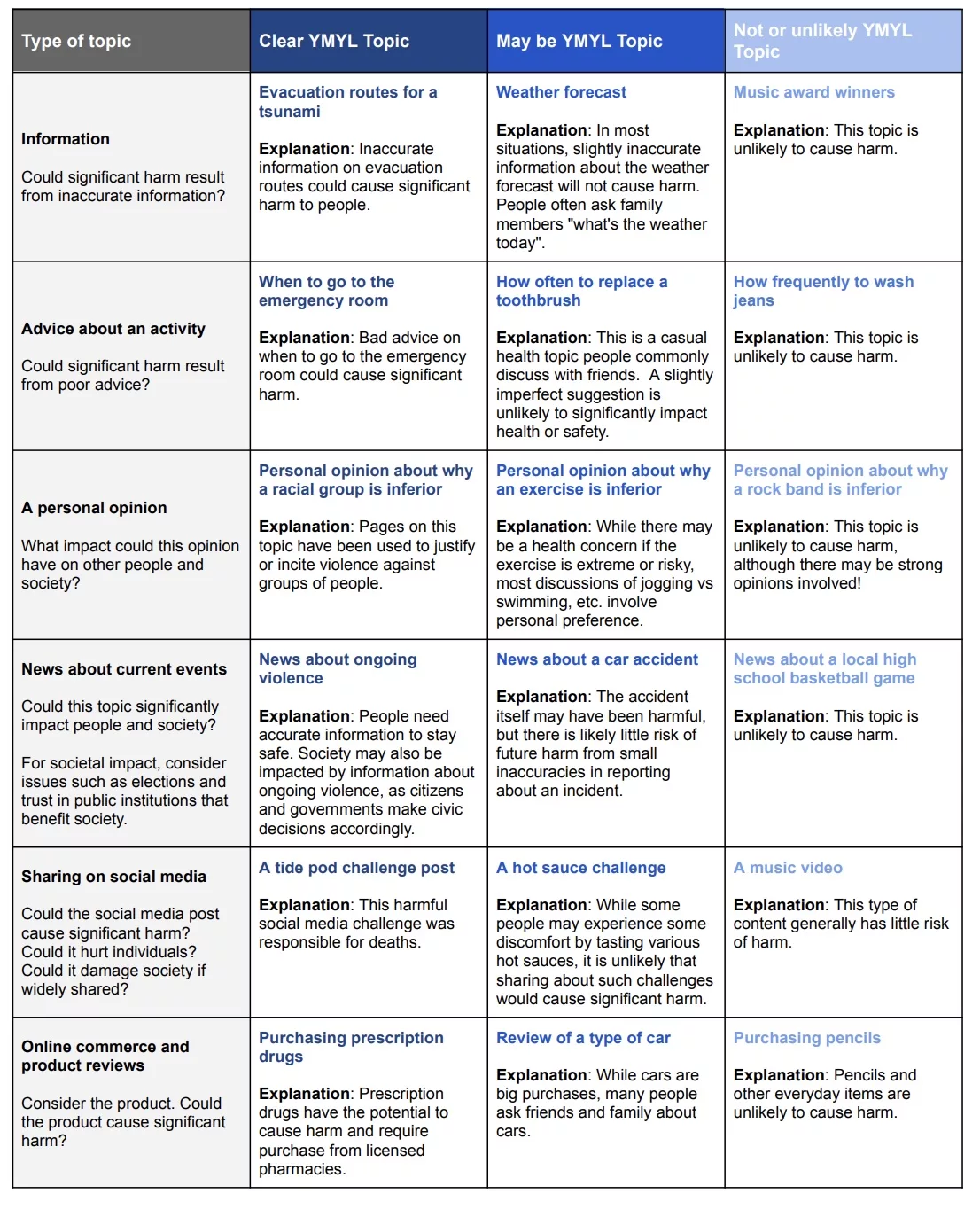
Google’s EAT
Expertise, Authority, and Trust (E.A.T.) fall at the heart of any good healthcare or medical SEO campaign. This concept attempts to quantify the subjective topic of authority. If your website, and more specifically an individual page, speaks about a topic that could have adverse outcomes on someone’s health, you need to prove it was produced and/or reviewed by an individual of authority to speak on that topic. This concept of authority is monitored on a page level, meaning that even if an entity is seen as an authority on a domain level, the individual page doesn’t automatically assume equal authority. Our team is constantly touting our ability to translate our clients’ physical or real-world authority into the digital space. Simply adding in a medical reviewer or a last date reviewed will not suffice to prove you are an authority. Exhaustive efforts need to be made to review the content against medical consensus and prove the information is not harmful to a user. If your healthcare SEO agency isn’t leading with this concept, you should run for the hills.
On Page SEO
Keywords
Once it’s understood that your content is being held to a higher standard and you have the authoritative experts to speak on your key topics, keywords are the most important area to start. Google has stated that pages with less technical SEO factors will outrank because of proper content and authority indications. In other words, the gap between what healthcare calls itself and the consumers of it speak continues to be the largest area of opportunity in healthcare SEO campaigns. We are constantly preaching about the massive language barrier between care providers and healthcare customers. In one instance our team mapped over 1800 consumer / layman keyword variations for a single surgical intervention which only had twelve medical keyword variations. That means that for every one medical-heavy keyword or key phrase we mapped 150+ consumer variations that led to that condition.
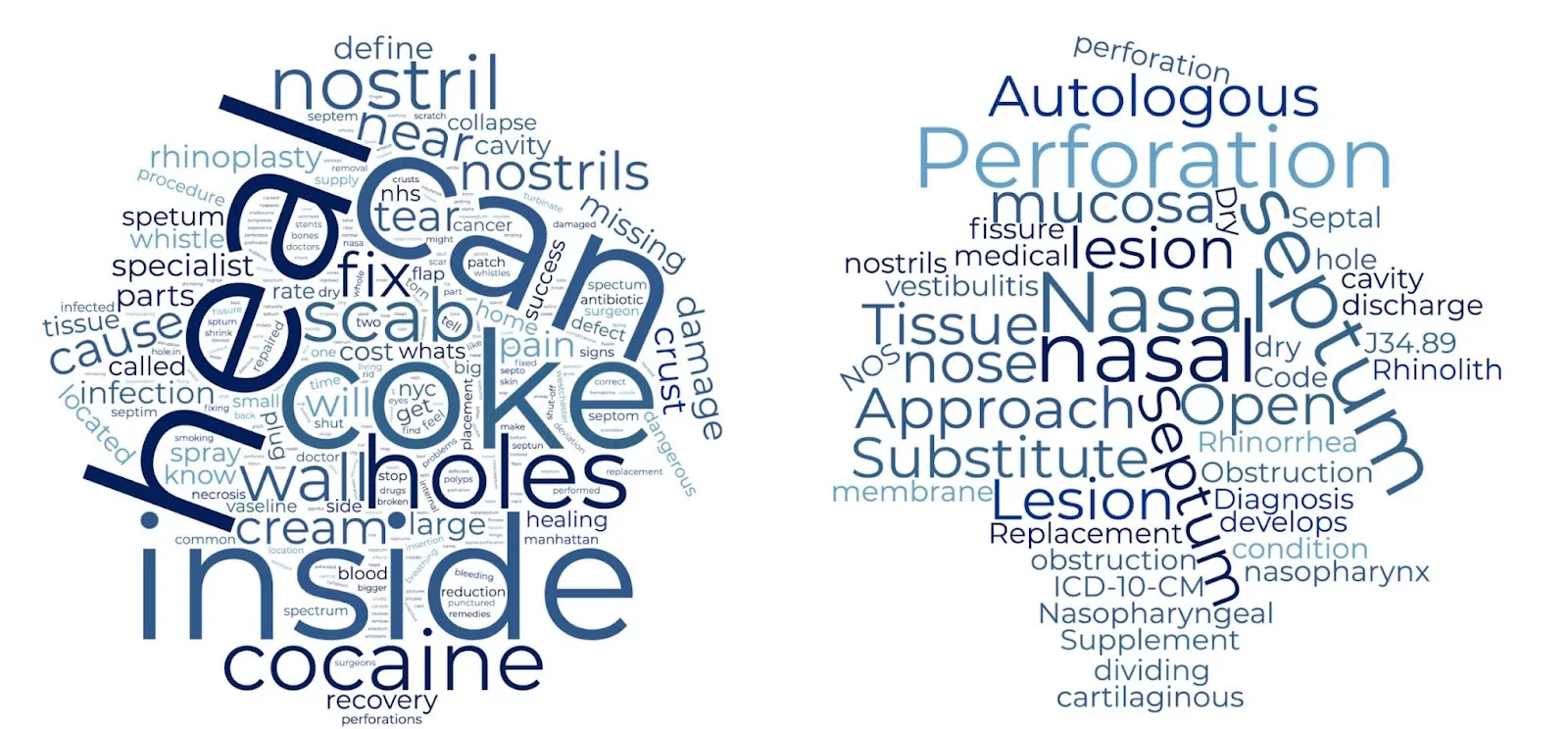
From step one, it is critical to not solely rely on Google search console or keyword planner. A patient journey keyword research project needs to be at the heart of all healthcare SEO campaigns. The previous research tools provide a great quantitative foundation, but equal weight needs to be given to the qualitative way consumers speak. You need to consider what they are saying online and in forums, to their providers in person, to their significant others, and in general as they’re navigating their healthcare journey.
Once you have a balanced understanding of how people are searching and how people are talking about your healthcare services, you can begin to translate that into digestible media. This visual gives a stark example of the differences between what the business of healthcare says, how people search, and how people communicate.
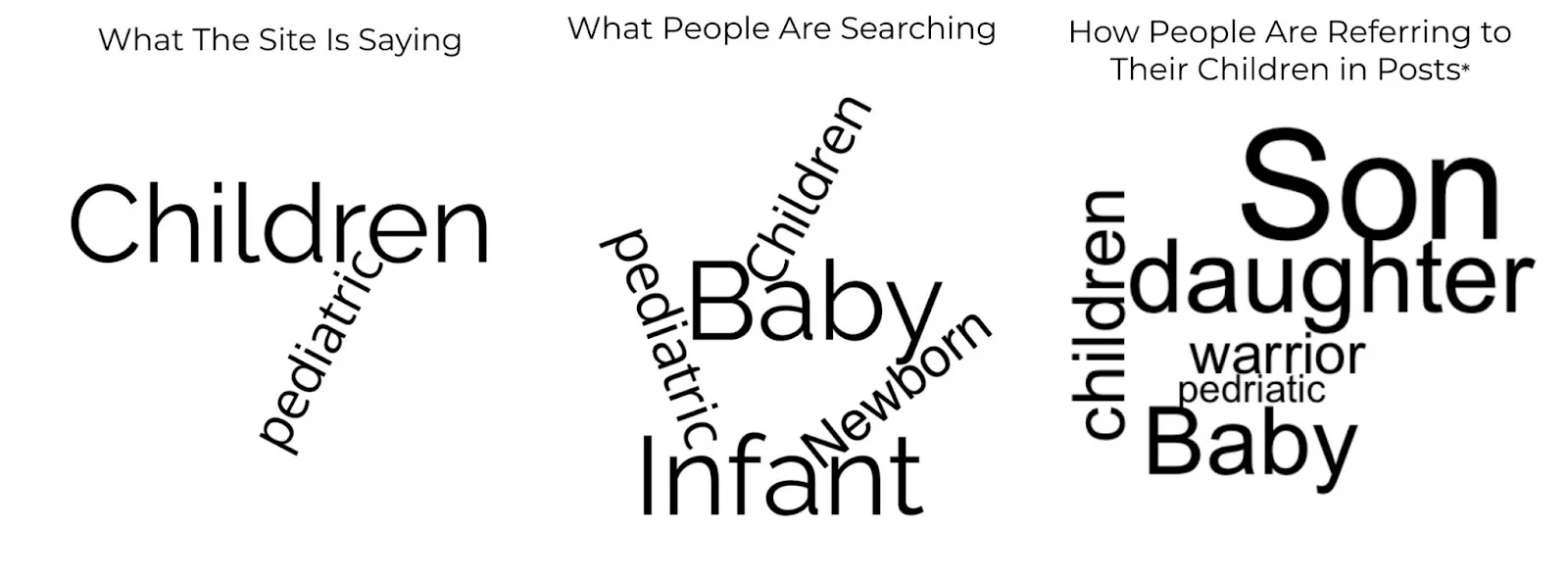
Content / Video
Once you have your keyword and language foundation in place, expanding it into informative and digestible content becomes the next step. It’s not as simple as injecting a few key words into existing copy or repeating the important keywords throughout the title and subtitles. A full site audit should be done to understand which pages may be competing with each other and where the greatest opportunity for traffic growth exists.
The common mistake we see people make while producing content for healthcare SEO campaigns is to produce medical-heavy, textbook style information. While that structure is a good foundation to start, the information needs to be translated into understandable, consumer-friendly language along with keyword consideration to hit all relevant consumer topics. They should be paired with the information consumers need to help educate and clarify what they’re going through.
Using the schema.org healthcare guidelines provides a good structured starting point. Take the structured data table of a medical condition page as an example. It gives you the initial framework of clinical questions to ask to gather the initial information needed.
- Where does this condition affect the body?
- How can it be diagnosed?
- What is the most likely outcome?
- What are possible complications?
- What are possible treatments?
- How is it prevented?
- What are risk factors?
- And much more
We suggest starting with written content, but always pairing that with video content. Not only do different demographics digest information through different mediums; people also search each platform in different ways. To achieve a comprehensive healthcare SEO campaign, we suggest pairing mixed media assets to educate your potential patients throughout their entire online research journey. Video becomes the perfect opportunity to showcase a balance of quantitative and qualitative language along with approachable authority in the individual care providers. Using your keyword research and long-form content as a guide, you can produce digestible video assets which further your statement of authority on a particular topic.
Authorship
Because we firmly believe all health-related web pages fall under the E.A.T. category, authorship becomes an important piece after media creation. It’s very easy to see who is a content creator on video, but isn’t as clearly designated in written form. It’s important to understand that signing an author or content reviewer to existing content will not improve your health care SEO efforts by itself. Having one general medical reviewer also will not suffice. If you are speaking on a wide range of topics, it’s necessary to have a topical specialist in each area.
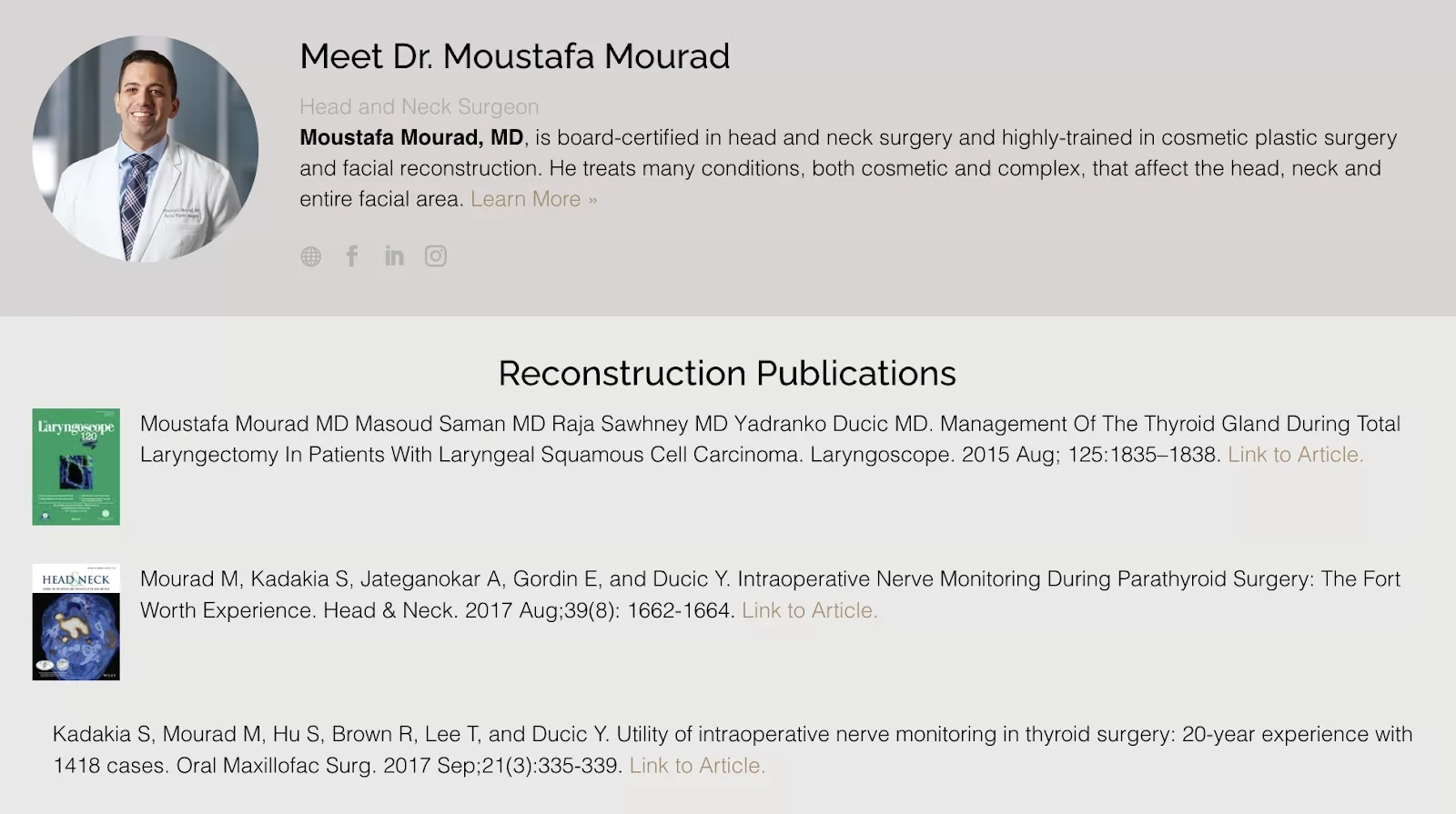
User Experience
User experience is often limited to traditional marketing metrics and page experience testing. While those are important and should not be overlooked, we emphasize user experience from an easy and preferred method of communication. Navigating the complexities of your own healthcare on top of the insurance and billing for it is stressful enough. Making the initial inquiry as frictionless as possible is important. The endless amount of complex call trees, medical taxonomy, doctor finders, and incorrect contact information continues to surprise us.
Forward thinking brands are separating themselves from the crowd by removing the onus to know exactly who to see and how to reach out from the patient. The term ‘care navigator’ is often used to label this position but this role, simply put, is having someone who advocates on behalf of your patient (customer). This can come in preferred methods of communication that must be structured with a patient first mentality. The adoption of chat is important, but deploying it in a manner that meets the complex needs of your business is just replacing one problem with another.
Speed, Security, Mobile
There is an endless amount of technical guides and metrics on why site speed and mobile use must be prioritized. I’m keeping this section brief, not to minimize its importance, but because these topics are exhaustively covered elsewhere. Helpful tools can be found Developers Google Speed, Page Speed and Lighthouse.
Digital Business Growth
The continued evolution of healthcare brands inevitably involves rebranding, patient acquisition, and de novo location opening. The opportunity loss can not be understated in the traffic, authority, and patient volume that can be missed if this is not handled correctly. In-depth content and technical review must be performed to ensure you aren’t combining competing pages, you are properly redirecting existing traffic, you are combining and leveraging existing reputation, and you are communicating a seamless transition.
Backlinks and Citations
Much like I mentioned in the site speed section, there are endless tools and lists on traditional healthcare SEO backlinks. While these are important, they have become commonplace and saturated. With the emphasis on authority becoming more and more present in the last few years, we think about links and citations from more of a speciality/topical perspective. While having a correctly filled out profile on a HealthGrades or WebMD is important, it only provides a partial threshold of indicating authority. It separates your website from the general internet as having doctors on staff. But now you have to convey how you are more of a topical authority relative to other doctors.
The first area of opportunity we look for are topical off site healthcare SEO backlinks and citations. While this list isn’t exhaustive, we consider it the next level of authoritative ‘directories’:
- Board Certification Profiles
- Medical Association Memberships
- Publication and Research Paper Citations
- Local Community Outreach Events and Partners
- MedlinePlus.gov
- SAMHSA.gov
- Insurance search
The next area of opportunity for topical off site healthcare backlinks is from the patient community perspective. There is less of a clear starting point with this approach, but using your existing patients and/or current efforts as a guide will allow for a place to start.
- Do your medical associations link to or partners with patient support groups?
- Where do your potential and current patients communicate with each other online?
- How do patients find care in areas you don’t service?
Use these and similar questions to start your research on finding areas of opportunity to communicate your professional experience and authority. This is another area where just getting your name mentioned or listed on a directory is not the solution. Educating the community and fostering a genuine conversation around your area of speciality is the first priority.
Social Media
Social media can be a platform for community outreach, but it is also a platform for validation during a prospective patient’s research journey. Social media platforms have become the fastest-growing, but still the smallest, channel for patient attraction. Their current value to improving your healthcare SEO efforts is undeniable.
Having a built out and active profile has, at minimum, acted as a validation along the research path. We are now seeing a shift to 1st step search directly on social media platforms. With the recent announcement from TikTok that they are furthering the ability to search directly on the platform, they are emphasizing the importance of… keywords and links. That is, the same two key factors traditional search engines have prioritized for decades.
The ‘concern’ on social media based search is that virality or popularity doesn’t always translate to authority. This presents a great opportunity, not dissimilar to Youtube, to provide authoritative content directly from the voice itself.
As consumers and potential patients shift their decision making habits more towards social media platforms, healthcare SEO efforts can take the structure and learnings from traditional search engine campaigns and begin to translate them into other search outlets.
Local SEO
Local healthcare SEO efforts are among the most important efforts to be taken. As a physical service provider this is the biggest area of opportunity against large authoritative brands like Mayo and Cleveland Clinic. Simply, they can not physically be everywhere. Google will preferentially show websites and businesses that match a user’s location when there is an intent to find care.
There is no way to separate local SEO from the other sections of this guide. Local links/citations, keywords, social media and on page schema all factor into local healthcare SEO efforts. Beyond having a separate and properly built out location(s) URL on your website, the single most important area to focus on is your Google Business Profile (formerly Google My Business).
Reputation/GMB
The power of having a claimed, optimized and continual reputation on Google Business Profiles is incomparable. There are three main rules of thumb in gathering reviews:
- Quantity – volume matters
- Quality – positivity matters
- Recency – continually attracting review matters
This is another area we specialize in and find a great return on investment: reputation management for doctors. and physicians.
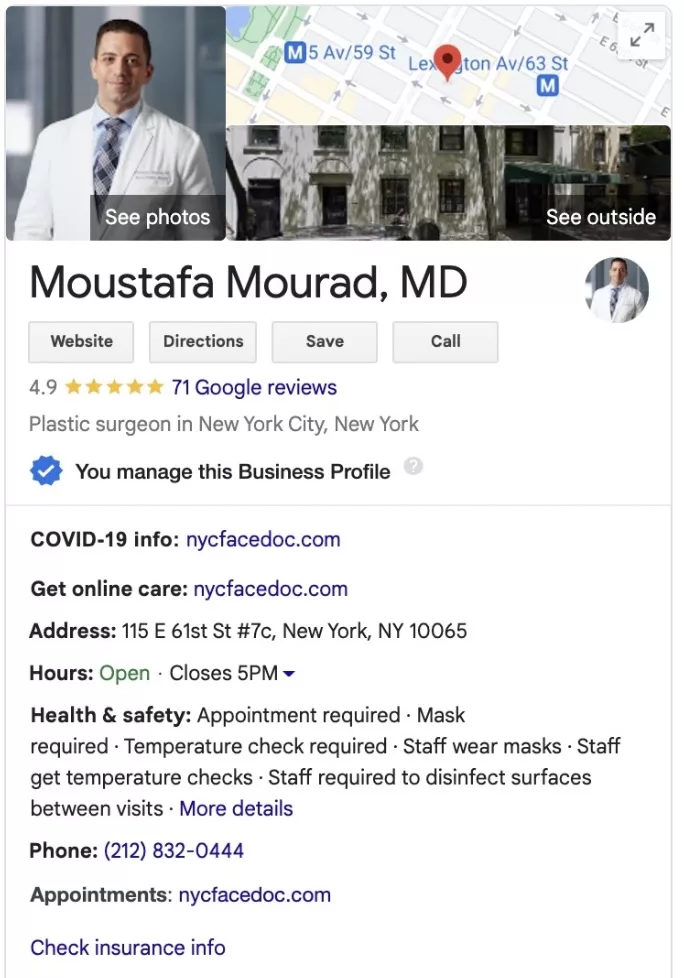
A couple of best practices and data points we often see areas of improvement in are:
- Multi Doctor / Locations Brands: Make sure to link to separate URLs for the individual practitioner or location listings
- Make sure to promote Brand and Provider Listings
- 7 to 1 Appointment Ratio: For every seven appointments driven by a brand location listing, one is driven by an individual provider location listing.
- Content Matters: speak in and encourage patients to write reviews in the language common to them. When patients are searching for specific procedures online, the providers and practices with the most matching keywords will come up first. Google even pulls out keywords at the top as a filter for patients to use to read other patients’ experiences.
FAQ
What is medical or healthcare SEO?
Healthcare SEO is the specialization of search engine optimization specifically for the healthcare industry. Whether your SEO campaigns are B2B or B2C, the ‘customer’ journey within healthcare is a unique path. Combining that with the higher bar that search engines put in place for health related topics, healthcare is arguably the most complex industry for SEO professionals.
How does a marketing agency specialize in healthcare?
A marketing agency that specializes in healthcare solely focuses on the complexities, compliance, and patient journey that is unique to healthcare. Finding an agency that solely focuses on healthcare will address the large learning gap that a non-specialized agency would have to bridge in attempting to apply traditional SEO efforts to the healthcare industry.
What makes a ‘good’ healthcare SEO agency or group?
A ‘good’ healthcare agency certainly has to perform and provide the desired results. But just as importantly, it’s necessary to understand the complex marketing and business requirements needed to perform. A ‘good’ healthcare SEO agency is able to advise in all areas, whether it is the SEO concepts of E.A.T. and Y.M.Y.L or data control of PHI.
What are Google’s E.A.T. and Y.M.Y.L. concepts?
Google introduced the concepts of Expertise, Authority and Trust (E.A.T.) and Your Money, Your Life (YMYL) through their quality raters guidelines. These guidelines provide an outline to thousands of real people who provide feedback to the algorithm’s results. Sections of the document cover YMYL, which distinguishes content that speak to someone’s financial or physical health. If your website falls under this category, you are held to a higher standard to prove you are an adequate expert (ie – E.A.T) in your field.
Summary
In review, SEO campaigns have evolved drastically to be much more complex and holistic. No single effort or one time cleanup will solve everything. This is particularly evident in healthcare SEO campaigns where the need to consistently review, update, and compare content against medical consensus is required. Finding the right healthcare SEO agency will make all the difference in achieving results that position you as an authority.
